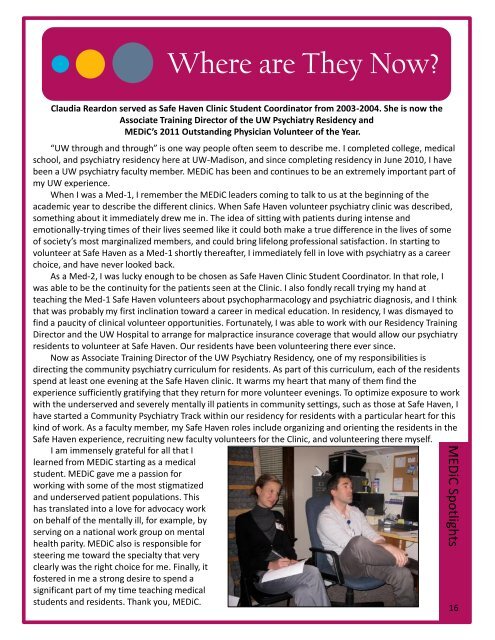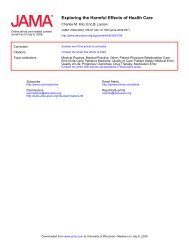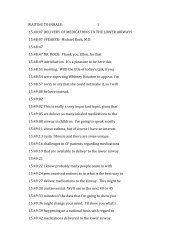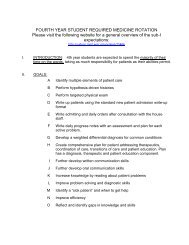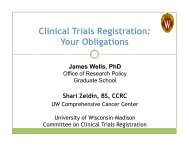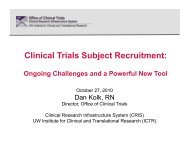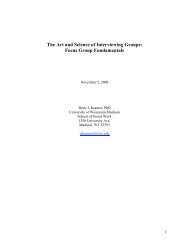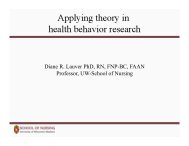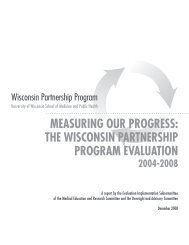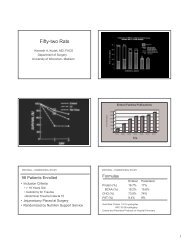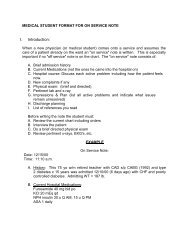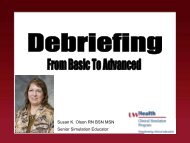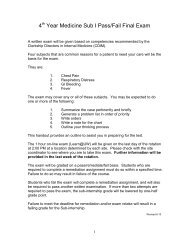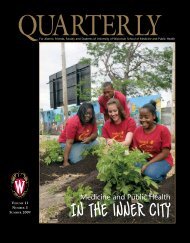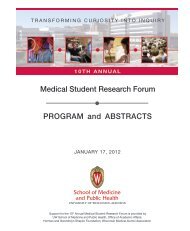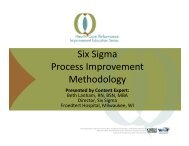Student-Run Free Clinics ANNUAL REPORT 2011 - University of ...
Student-Run Free Clinics ANNUAL REPORT 2011 - University of ...
Student-Run Free Clinics ANNUAL REPORT 2011 - University of ...
Create successful ePaper yourself
Turn your PDF publications into a flip-book with our unique Google optimized e-Paper software.
Where are They Now<br />
Claudia Reardon served as Safe Haven Clinic <strong>Student</strong> Coordinator from 2003-2004. She is now the<br />
Associate Training Director <strong>of</strong> the UW Psychiatry Residency and<br />
MEDiC’s <strong>2011</strong> Outstanding Physician Volunteer <strong>of</strong> the Year.<br />
“UW through and through” is one way people <strong>of</strong>ten seem to describe me. I completed college, medical<br />
school, and psychiatry residency here at UW-Madison, and since completing residency in June 2010, I have<br />
been a UW psychiatry faculty member. MEDiC has been and continues to be an extremely important part <strong>of</strong><br />
my UW experience.<br />
When I was a Med-1, I remember the MEDiC leaders coming to talk to us at the beginning <strong>of</strong> the<br />
academic year to describe the different clinics. When Safe Haven volunteer psychiatry clinic was described,<br />
something about it immediately drew me in. The idea <strong>of</strong> sitting with patients during intense and<br />
emotionally-trying times <strong>of</strong> their lives seemed like it could both make a true difference in the lives <strong>of</strong> some<br />
<strong>of</strong> society’s most marginalized members, and could bring lifelong pr<strong>of</strong>essional satisfaction. In starting to<br />
volunteer at Safe Haven as a Med-1 shortly thereafter, I immediately fell in love with psychiatry as a career<br />
choice, and have never looked back.<br />
As a Med-2, I was lucky enough to be chosen as Safe Haven Clinic <strong>Student</strong> Coordinator. In that role, I<br />
was able to be the continuity for the patients seen at the Clinic. I also fondly recall trying my hand at<br />
teaching the Med-1 Safe Haven volunteers about psychopharmacology and psychiatric diagnosis, and I think<br />
that was probably my first inclination toward a career in medical education. In residency, I was dismayed to<br />
find a paucity <strong>of</strong> clinical volunteer opportunities. Fortunately, I was able to work with our Residency Training<br />
Director and the UW Hospital to arrange for malpractice insurance coverage that would allow our psychiatry<br />
residents to volunteer at Safe Haven. Our residents have been volunteering there ever since.<br />
Now as Associate Training Director <strong>of</strong> the UW Psychiatry Residency, one <strong>of</strong> my responsibilities is<br />
directing the community psychiatry curriculum for residents. As part <strong>of</strong> this curriculum, each <strong>of</strong> the residents<br />
spend at least one evening at the Safe Haven clinic. It warms my heart that many <strong>of</strong> them find the<br />
experience sufficiently gratifying that they return for more volunteer evenings. To optimize exposure to work<br />
with the underserved and severely mentally ill patients in community settings, such as those at Safe Haven, I<br />
have started a Community Psychiatry Track within our residency for residents with a particular heart for this<br />
kind <strong>of</strong> work. As a faculty member, my Safe Haven roles include organizing and orienting the residents in the<br />
Safe Haven experience, recruiting new faculty volunteers for the Clinic, and volunteering there myself.<br />
I am immensely grateful for all that I<br />
learned from MEDiC starting as a medical<br />
student. MEDiC gave me a passion for<br />
working with some <strong>of</strong> the most stigmatized<br />
and underserved patient populations. This<br />
has translated into a love for advocacy work<br />
on behalf <strong>of</strong> the mentally ill, for example, by<br />
serving on a national work group on mental<br />
health parity. MEDiC also is responsible for<br />
steering me toward the specialty that very<br />
clearly was the right choice for me. Finally, it<br />
fostered in me a strong desire to spend a<br />
significant part <strong>of</strong> my time teaching medical<br />
students and residents. Thank you, MEDiC.<br />
16<br />
MEDiC Spotlights


